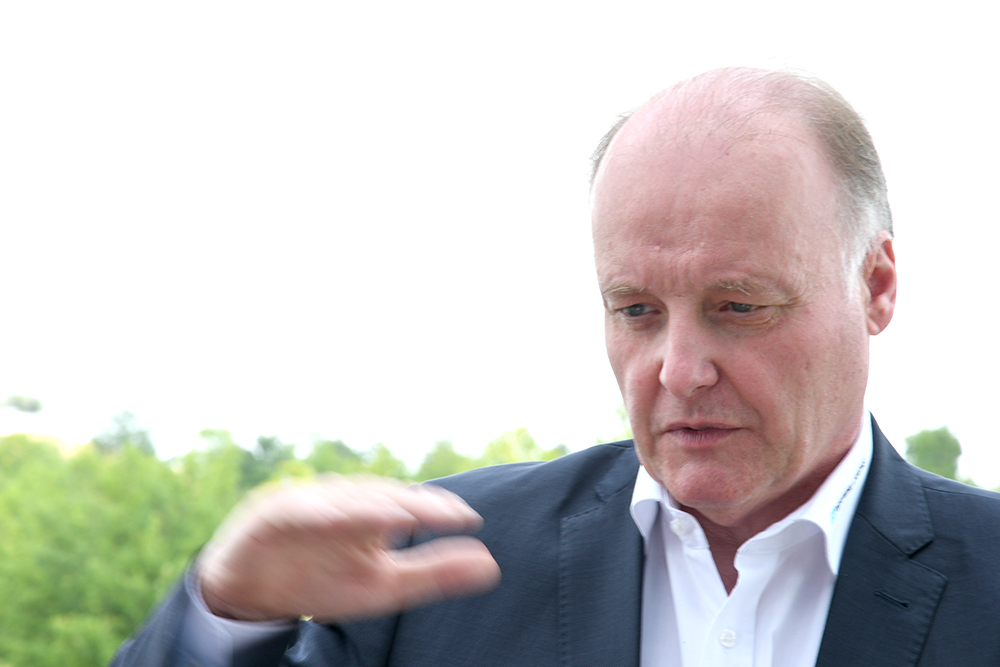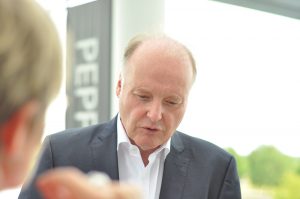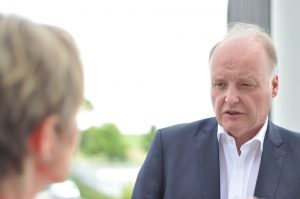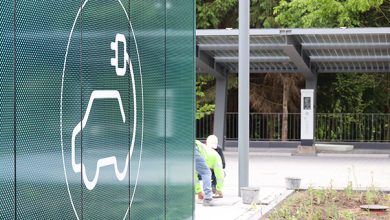Dr. Gunther Kegel is CEO of Pepperl+Fuchs AG and president of the German Electrical and Electronic Manufacturers’ Association, ZVEI. And thus, quasi automatically, a supporter of an All Electric Society. In an interview with Angela Josephs, Head of Corporate Communications at Phoenix Contact, he outlines how this vision can be implemented.

The automation expert believes that a world whose motor is electricity is also future-proof for future generations. The president of the ZVEI was a participant in this year’s Digital Days, the virtual trade fair event at the Hannover Messe. This was where we met the trained engineer and top manager.
UPDATE: The ZVEI has launched a campaign called “Innovation protects climate“. How does that work – how can innovation protect the climate?
In fact, this is a big issue for us and we as an industry have a lot to say about it. Today we are facing the biggest challenges in human history – namely climate protection and global warming. We need a climate that, in the long term, must make the lives of around eleven billion people possible.
UPDATE: Are you expecting that the use of fossil fuels will be stopped completely?
We will use these energy sources differently, for example to produce plastics or medicines. They will remain indispensable. After all, natural gas has long since become not only an energy source for the chemical industry, but also the basic material for many products.
UPDATE: Economy in the service of ecology – is that now, provocatively asked, the green coat of an industry ?
No, rather the opposite. We must accept that the most powerful instrument for change is the market economy system. For the entrepreneur, it must be sensible and profitable to invest in decarbonization, then he will do it. And for the individual person it must also be financially attractive to engage in CO2-free things. In this way I am putting the economy at the service of ecology. Only if we manage to provide this incentive will everyone rally behind it. Otherwise I will only reach the idealists who take responsibility out of themselves. But that is only 10 or 20 percent, not the decisive mass.
UPDATE: Attractiveness for individuals and companies means, however, that politics must create the framework conditions for this.
They are the only ones who can create these framework conditions. One example is the need to price CO2. This must be the decisive steering element with which we work. This makes it worthwhile to think and act away from CO2 and towards renewable energies.
You wouldn’t have to invent new taxes for that. Those that already exist would have to be balanced in such a way that future technologies would be profitable and competitive more quickly. We are still not doing this consistently enough today. There is still too much resistance on the grounds of alleged protection of trust or investment. But the necessary social change is also enormous.
UPDATE: Are the changes and the related disruptions in technology and economy too slow?
This is always the question of what time scale you are using. When you say today that it will take another 20 years, it sounds painfully slow. If you look around you in 20 years, you will see that no stone has been left unturned. That is already powerfully disruptive. For a social system, for a society, 25 years is a very short time. You can hardly complete any transformation in that time without there being severely disadvantaged people. And we absolutely have to avoid that this transformation leads to a rupture in society and that there are large groups of people who become losers as a result.
UPDATE: Science has been pointing out this problem for decades. Has the economy overslept and thereby made the problems bigger?
You can see it that way. It took time for the idea of climate protection to develop out of schools and universities. In the years from 2000 to 2007, we had a period without a temperature increase. All the forecasts imploded because they were all wrong. That’s why it took a long time for the conviction to prevail that climate change had begun. There are still very influential political figures in the world today who deny this change.
UPDATE: Then why doesn’t a much earlier and more energetic implementation happen ?
In the early phase of the discussion, the theory of consistent renunciation was the wrong approach, because it was clear from the beginning that it would not work. For far too long, climate protection and renunciation have been coupled. If we had made it clear from the outset that we had to solve the problem technologically, we would be much further along today.
UPDATE: So climate protection receives a completely different consensus, also in the business world ?
Yeah, that’s right. In the beginning the climate protectors, today’s Greens, were a reservoir of phantoms. But after a few years, the Greens were the only ones who understood a sustainable, long-term and intelligently constructed environmental and energy policy, which then continued on and on for many many legislative periods.
Today we are at about 55 percent of the power generation from renewable energies. This would not have been possible without the Greens and their clear strategic, sustainable approach. After all, we have not only abandoned nuclear energy, but have massively entered the energy of renewables.

UPDATE: But don’t we have to step on the gas at exactly this time, right now?
Of course. And if the state wants to set impulses, then it must set them exactly there. When I think of the Upper Lusatia region, for example, and its structural change, I would go there with large refineries to produce synthetic fuel. With 30 percent of all fuel produced for German mobility, many problems would be solved immediately. Jobs in this region, technological leadership and also a much cleaner technology than the entire surface and underground mining industry today.
But I still don’t see this willingness to take risks. Even if there is no alternative. We need to arrive at these new technological concepts.
Phoenix Contact
Zentralverband Elektrotechnik Elektroindustrie ZVEI
Pepperl+Fuchs







